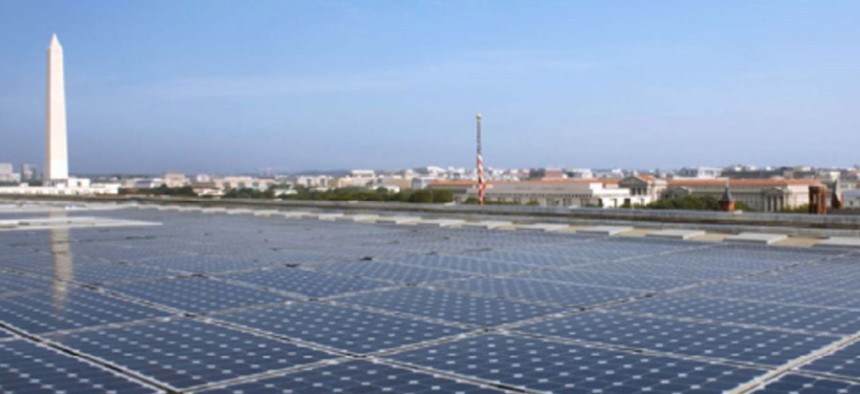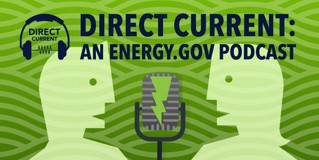
The D.C. skyline is shown in front of the photovoltaic array on top of the Forrestal Building, headquarters of the Energy Department. Energy Department file photo
The Department of Energy Launched a Surprisingly Great Podcast
Direct Current has all the quirks of public radio, and a lot of useful information about clean energy policies.
Solar panels: they’re the stuff of policy and how-to articles (and in the Netherlands, bike lanes). Now, they’ve entered podcast territory, too.
In an unexpectedly delightful mashup of the federal government and NPR-style commentary, the Department of Energy has recently launched its own podcast, Direct Current (other names jokingly in contention: This American Lightbulb and Wait, Wait, Don’t Accelerate Me). Matt Dozier and Allison Lantero from the digital team of the DOE Office of Public Affairs play host. The show has all the trappings of a public radio segment: high production quality, catchy tunes, and an accessible take on relevant, often-complicated subject matter.

Courtesy of the Department of Energy
The first episode takes a look at the department’s four-decade history, drawing on audio archives dating back to 1977, when snow was falling in Miami, Cincinnati recorded record-low temps, and Jimmy Carter was sworn in as the president of the United States. Upon taking office, Carter promised a new cabinet department devoted to overhauling the nation’s energy policies, a difficult effort that would be “the moral equivalent of war,” Carter said at the time. The podcast splices together a gravelly recording of Carter’s April 18, 1977 broadcast with Lantero’s narration.
Fast-forward to the present, and clean energy is still, clearly, a pressing subject. But it’s one that Lantero and Dozier feel could benefit from a human perspective. “A lot of these topics are discussed in very technical terms,” Lantero says. “It’s our job to break them down and make them more accessible to the general public.”
For the rest of the first episode, Dozier digs into the hidden costs of installing solar panels through an interview with a Washington, D.C. teacher coming up against the “cold, harsh reality of local bureaucracy” in trying to bring clean energy to her high school; he also speaks with Chris Carrick of the Central New York Regional Planning and Development Board, where the successful Solarize campaign is connecting community organizations with solar panels and the net meters necessary to accurately track the amount of energy consumed.
In future episodes, Dozier will pull back the curtain on a little-known aspect of the DOE: its “Ask an Expert” service, which enables countries around the world to consult the DOE for advice on how to implement clean energy policies. “It’s free tech support, so to speak,” Dozier says. Direct Current’s take on it will be tied into the Clean Energy Ministerial, the follow-up to the Paris climate talks set for June 1-2 in San Francisco. And Lantero will investigate Hoboken, New Jersey’s plans to implement a microgrid to prevent power outages in the event of another Sandy-scale hurricane. “A lot of times, we take electricity for granted until it goes out,” Lantero says.
The whole point of podcasts is to integrate complex, thought-provoking concepts into the fabric of our daily lives: we tune in during our commutes, while cleaning our apartments, or while going for runs. Part of what the DOE is trying to do with Direct Current, Lantero says, is to connect with people, and get them thinking about how the DOE’s work can directly affect them. “This is our way of saying we’re doing really important, interesting things,” Lantero says, “possibly in your neighborhood.”
NEXT STORY: What I Learned From My 360-Degree Assessment






